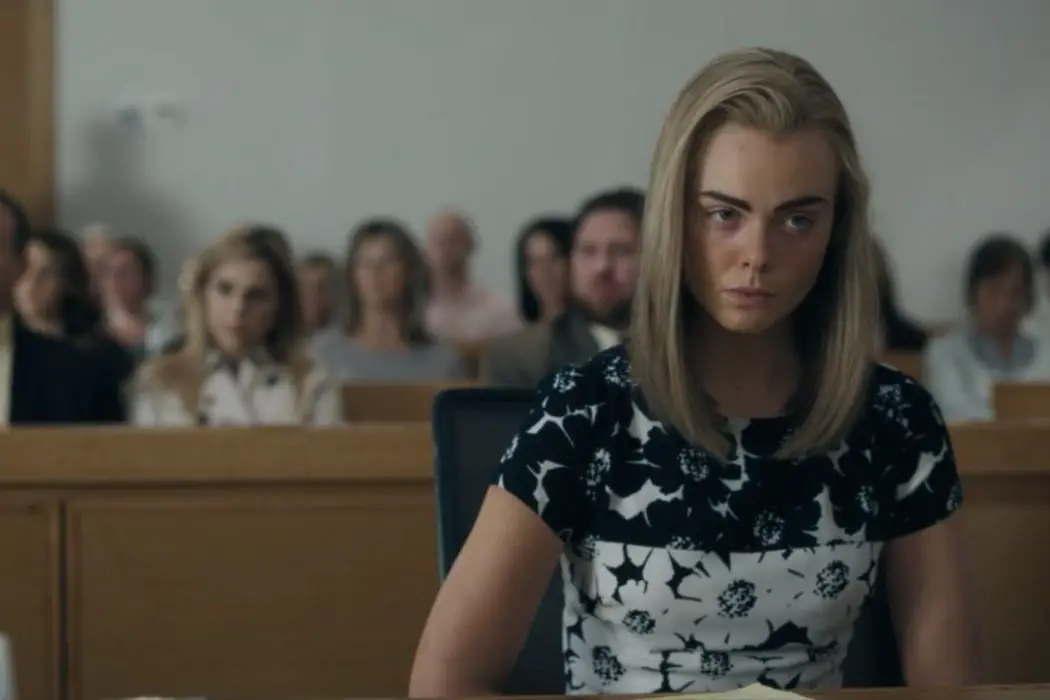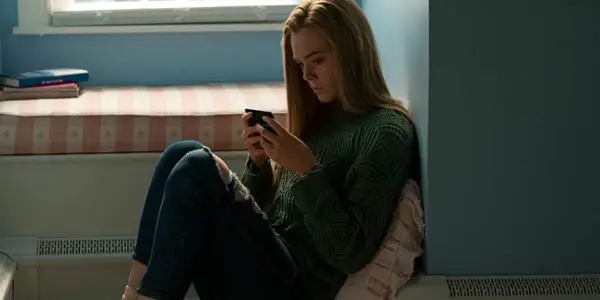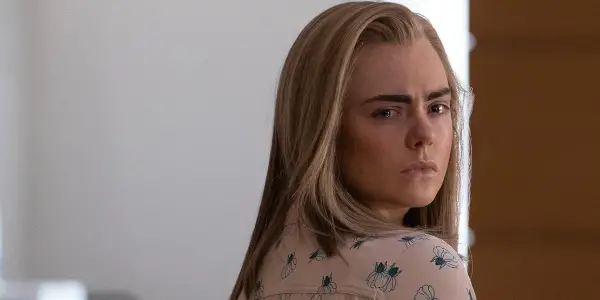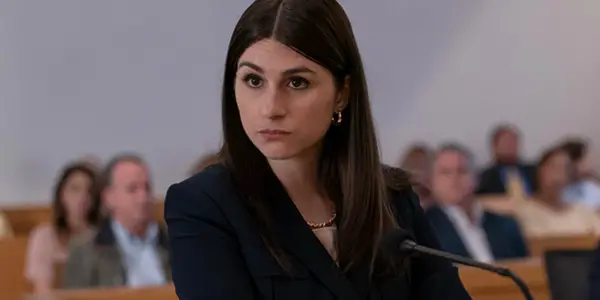THE GIRL FROM PLAINVILLE (S1E7) “Teenage Dirtbag”: The End Is Near

Stephanie Archer is 39 year old film fanatic living in…
Last week left us with the catalyst of events, yet while we had expected a moment, a solid explanation to cling to, viewers were left with an understanding that there is more behind the scenes than could ever have been imagined. Last week’s episode of The Girl from Plainville finally depicted the fight between Conrad (Colton Ryan) and his father (Norbert Leo Butz), the aftermath leading to not only Conrad’s seemingly permanent pessimistic outlook on his future but altering Michelle’s (Elle Fanning) involvement as well. Where viewers may have struggled with their waning and waxing of empathy and compassion for Michelle, “Talking is Healing” pulled you in more. And “Teenage Dirtbag” only drove it harder.
The Girl from Plainville does not necessarily ask its viewers to change their viewpoint on Michelle, or the situation as a whole. What it does do is offers more sides to the story than the media presents to its audience. There is more than the clickbait headlines that lure readers into stories – there are humans and the rippling effects of their actions, no matter the intent. “Teenage Dirtbag” truly challenges the media perspective and the presumptions surrounding Michelle and “the girl who texted her boyfriend to kill himself” image many have come to know and accept. Rather, it asks viewers to not only question her situation but the various environmental factors that play into the behavior and decision-making of teenagers in the modern world.
Preparing for the End
“Teenage Dirtbag” picks up where we left off, the morning following a text from Conrad that had indicated he may have taken his life. Viewers watched as Michelle lay awake, with no contact information to reach out to Conrad’s family or friends, the dawn bringing relief that Conrad had not taken his own life, but an understanding of the strain their relationship and the evening had taken on Michelle. As the text messages are relayed face to face between Michelle and Conrad, there is a sadness, a heavy-hearted feeling, that sets in as we listen to the words exchanged between them. There is a feeling of preemptive, almost premeditated goodbye – as though they are letting go of the idea of each other. Not through a traditional breakup, but an acceptance of the inevitability of an approaching end.

There is a different context in this conversation, and in the ones that follow, “Teenage Dirtbag” able to reframe the text messages between Conrad and Michelle. We have been given snippets, primary examples of the encouragement of Michelle throughout the series thus far. Telling Conrad to drink bleach and to get back in the car create the framework of a manipulative and intentional act on Michelle’s part, leaving little room to question the vindictive behavior conducted behind a phone. Yet, as the episode progresses, and we watch them actually converse beyond a digital framework, a new perspective is completed and a different idea of Michelle emerges.
While we watch her support Conrad’s decision, we also hear the questions she asks, Michelle challenging his desire to die. If he really wanted to, he would have gone through with it already. There is a nativity that swells around the escalating nature of their text messages, the innocence of love and support both skewed and misunderstood. In the wake of Michelle’s own inability to mentally manage what is happening with Conrad, she is left with the fear of never knowing what happens to him – of knowing that he might die alone. It is a challenging perspective for the writers of the show to present to its audience, and not one presented lightly. The series has taken its time with Michelle, showing every aspect of her character, allowing audiences both to resent her as well as feel compassion for her. The Girl from Plainville has deeply invested in its depiction of her, both as a culprit and as a victim, and “Teenage Dirtbag” proves the path they have chosen to take artistically is worth it.
A World Run By Pharmaceuticals
In November, Hulu presented audiences with Dopesick, a series that looked at the OxyContin epidemic caused by the meditated and deliberate ignorance of a pharmaceutical company. In the wake of corporate greed, lives were destroyed and forever altered by the addicting effects of the drug and its ability to permanently change the chemistry of the brain. Throughout the series, Perdue Pharma did all that they could to avoid a “black box warning”, one of the harshest warnings the FDA can place on a medication. A label that warns of serious side effects. So I was surprised to hear that term brought up in the latest episode of The Girl from Plainville.

“Talking is Healing” not only delivered audiences the catalyst they had been waiting for, but it also brought its viewers to the heart of the courtroom. As opening remarks were made and witnesses were questioned on the stand, the Commonwealth of Massachusetts presented its case against Michelle Carter. “Teenage Dirtbag” breaks from the escalating text messages between Conrad and Michelle, bringing us to the defense’s latest witness, psychiatrist Dr. Peter Breggin.
Previously, Dr, Breggin had volunteered himself as a witness to the defense, citing his credentials in pharmaceutical psychology as a key element in defending Michelle. As he is questioned by Cataldo (Michael Mosley), he breaks down the science of SSRIs – Prozac, and Celexa. He breaks down how they are meant to clear a pathway for serotonin to enter the brain, further explaining that there is research that shows that instead, it can cause the body to cease producing secretion altogether. With this effect, there is a greater chance of suicide, especially in those 24 or younger. He further described the medications and their effects, stating this is why these medications carry a black box label.
As we take in the devastating effects the medications may have had on both Michelle and Conrad, he begins to zero in on Michelle specifically. As he speaks of “involuntary intoxication” – a legal term cited in the pharmaceutical packet – there is an understanding created that these medications may have the ability to render their user both unaware and unable to control their actions when they have reached a certain level of the drug under certain conditions.

Yet, as the series itself is dedicated to looking at all perspectives of the individuals it is following, so too does it hold these rules for the case itself. We are not left with only the defense’s cross-examination, but the prosecution as well. As they cross-examine, there comes into question the school of psychology versus the legal terms set forth by a medical institution. Involuntary Intoxication is not listed in the accepted DSM used to diagnose mental disorders, only a term created by a pharmaceutical company to cover themselves from liability. And as we learn, Dr. Breggin may have questioned those around Michelle to create a baseline, he never questions Michelle directly.
Conclusion
The Girl from Plainville‘s “Teenage Dirtbag” leaves viewers with a lot to question and think about, maintaining a basis for conversation. And with only one episode left, the conversation is far from over.
Have you seen the latest episode of The Girl from Plainville? What did you think? Let us know in the comments below!
Watch The Girl from Plainville
Does content like this matter to you?
Become a Member and support film journalism. Unlock access to all of Film Inquiry`s great articles. Join a community of like-minded readers who are passionate about cinema - get access to our private members Network, give back to independent filmmakers, and more.













